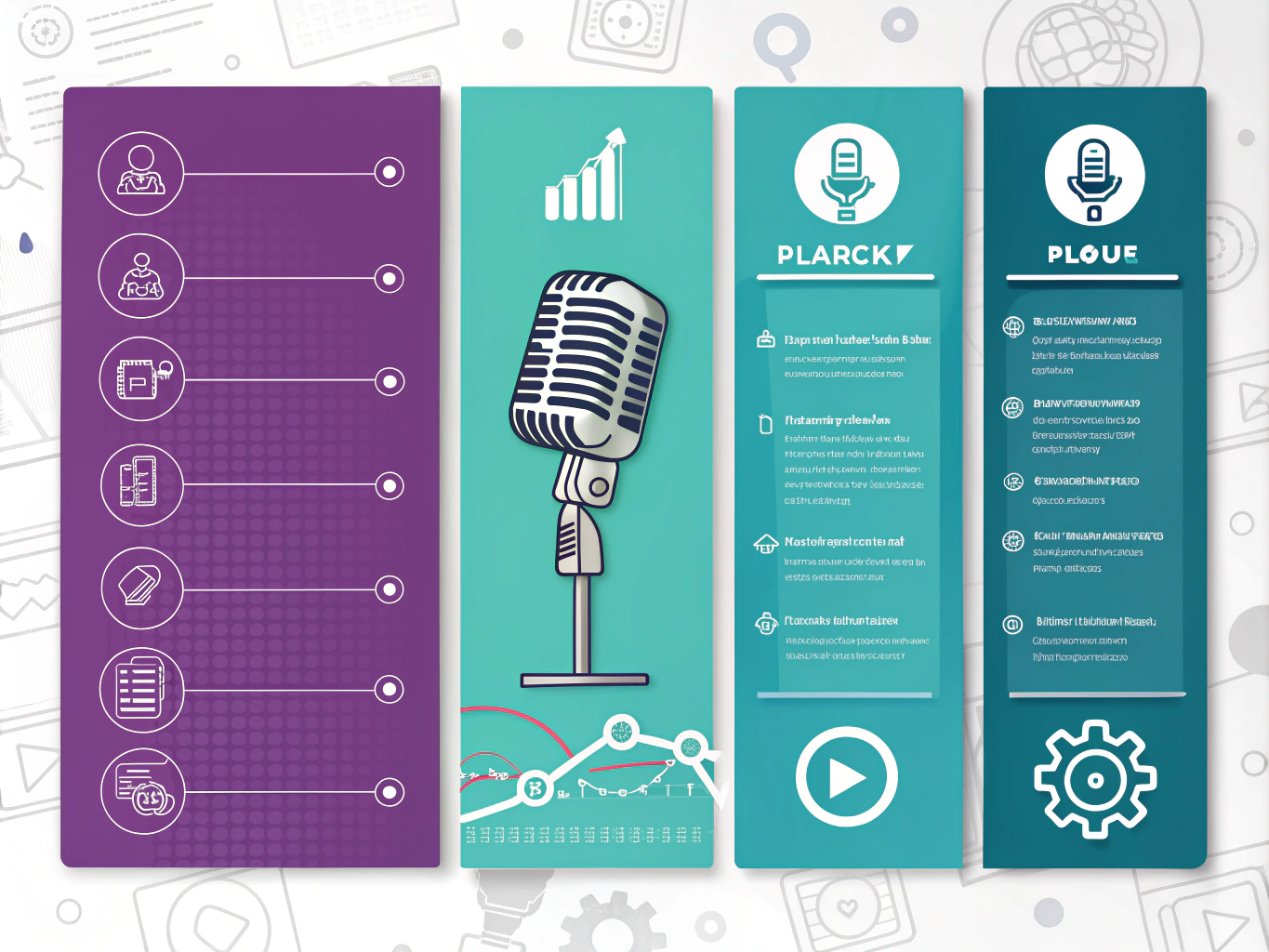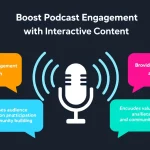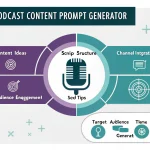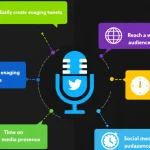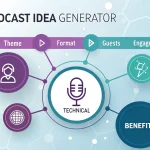Is this tool helpful?
How to Use the Podcast Development Guide Tool Effectively
To make the most of our Podcast Development Guide Tool, follow these simple steps:
- Enter the main theme or niche for your podcast: This field helps define the core focus of your show. For example, you might input “Sustainable Living” or “Historical Mysteries”.
- Describe your target audience: Provide details about your ideal listeners. A sample input could be “Eco-conscious millennials interested in reducing their carbon footprint” or “History buffs aged 25-45 who enjoy unsolved puzzles”.
- Specify topics or areas of focus (Optional): List potential subjects you’d like to cover in your episodes. For instance, “Interviews with environmental scientists, DIY eco-friendly home projects, sustainable fashion tips” or “Unexplained disappearances, ancient archaeological mysteries, debunking historical myths”.
- Propose a name for your podcast (Optional): If you have a catchy title in mind, enter it here. Examples could be “Green Living Today” or “Whispers from the Past”.
- Click “Generate Podcast Guide”: Our tool will process your inputs and create a comprehensive guide tailored to your podcast concept.
After submission, you’ll receive a detailed podcast development guide covering concept development, content creation, branding and marketing, monetization strategies, and distribution tips. You can then copy this information to your clipboard for further use in your podcast planning process.
Unleashing Your Podcasting Potential: The Power of Our Podcast Development Guide Tool
In the ever-expanding world of digital media, podcasts have emerged as a powerful platform for sharing ideas, stories, and information. Our Podcast Development Guide Tool is designed to empower aspiring podcasters and help them navigate the complex journey from concept to successful launch and beyond. This comprehensive tool serves as your personal podcast consultant, offering tailored advice and strategies to turn your audio dreams into reality.
Defining Your Podcast’s Purpose and Identity
At its core, our tool aims to help you crystallize your podcast’s unique identity. By prompting you to define your theme, target audience, and potential content focus, it encourages you to think critically about your show’s purpose and place in the podcasting landscape. This foundational step is crucial for creating a podcast that resonates with listeners and stands out in a crowded market.
Streamlining the Planning Process
Launching a podcast involves numerous moving parts, from content planning to technical setup and marketing strategies. Our Podcast Development Guide Tool simplifies this process by providing a structured framework for your podcast journey. It breaks down the complex task of podcast creation into manageable steps, ensuring you don’t overlook critical aspects of development.
Tailored Advice for Your Unique Vision
Every podcast is unique, and our tool recognizes this by generating customized recommendations based on your inputs. Whether you’re planning a niche show for a specific professional audience or a broad-appeal podcast on general interest topics, the guide adapts its advice to suit your particular needs and goals.
Benefits of Using the Podcast Development Guide Tool
1. Time and Resource Optimization
By providing a comprehensive roadmap for your podcast development, our tool helps you save valuable time and resources. Instead of spending hours researching various aspects of podcast creation, you receive a consolidated guide that covers all essential elements, allowing you to focus your energy on content creation and audience engagement.
2. Enhanced Strategic Planning
The tool encourages strategic thinking about your podcast from the outset. By prompting you to consider your target audience, content focus, and potential branding, it helps you develop a clear vision for your show. This strategic approach increases your chances of creating a podcast that not only launches successfully but also grows and evolves over time.
3. Confidence Boost for Newcomers
For those new to podcasting, the process can seem daunting. Our Podcast Development Guide Tool acts as a confidence booster, providing clear direction and actionable advice. It demystifies the podcasting process, making it more accessible and less intimidating for beginners.
4. Inspiration and Idea Generation
Sometimes, all you need is a spark to ignite your creativity. Our tool not only helps refine existing ideas but can also inspire new directions for your podcast. The comprehensive guide it generates may highlight aspects of podcast development you hadn’t considered, opening up new possibilities for your show.
5. Monetization Insights
For those looking to turn their podcast into a source of income, our tool provides valuable insights into various monetization strategies. From sponsorships to merchandise, it outlines potential revenue streams, helping you plan for the financial aspects of your podcasting venture from the start.
Addressing User Needs and Solving Specific Problems
Problem: Lack of Direction in Podcast Planning
Many aspiring podcasters struggle with the initial planning stages, unsure of where to begin or what elements to prioritize. Our Podcast Development Guide Tool solves this by providing a structured approach to podcast planning. It breaks down the process into manageable sections, ensuring you consider all crucial aspects of podcast development.
Example:
Let’s say you input “Sustainable Living” as your podcast theme, targeting “Eco-conscious millennials”. The tool might suggest starting with a series of episodes that introduce basic concepts of sustainable living, followed by practical tips and interviews with experts. This structured approach helps you map out your content strategy and gives direction to your planning process.
Problem: Difficulty in Identifying Target Audience
Understanding and defining your target audience is crucial for podcast success, but it’s a step many creators struggle with. Our tool addresses this by prompting you to think deeply about your ideal listeners and providing guidance on how to refine your audience definition.
Example:
If you input a vague target audience like “People interested in technology”, the tool might suggest narrowing it down to “Tech-savvy professionals aged 25-40 interested in emerging technologies and their impact on daily life”. This refined definition helps you tailor your content more effectively and guides your marketing efforts.
Problem: Uncertainty About Monetization Options
Many podcasters are unsure about how to monetize their shows effectively. Our Podcast Development Guide Tool tackles this by outlining various monetization strategies tailored to your podcast’s theme and target audience.
Example:
For a podcast on personal finance targeting young professionals, the tool might suggest a mix of strategies such as sponsored content from financial services companies, affiliate marketing for personal finance apps, and creating premium episodes with in-depth investment advice.
Problem: Technical Challenges in Podcast Production
The technical aspects of podcast production can be overwhelming for beginners. Our tool addresses this by providing tailored recommendations for recording equipment, editing software, and hosting platforms based on your podcast’s needs and budget.
Example:
For a solo podcast focusing on storytelling, the tool might recommend starting with a high-quality USB microphone, free editing software like Audacity, and a beginner-friendly hosting platform like Buzzsprout. It would also provide tips on creating a basic home recording setup to ensure good audio quality.
Practical Applications and Use Cases
1. Launching a Niche Educational Podcast
Imagine you’re a language teacher wanting to start a podcast to help people learn Spanish. You might input the following into our tool:
- Theme: Spanish Language Learning
- Target Audience: English-speaking adults aged 25-50 interested in learning Spanish for travel or work
- Content Focus: Conversational Spanish lessons, cultural insights, pronunciation tips
- Proposed Name: “¡Hablemos Español!” (Let’s Speak Spanish!)
Based on these inputs, our tool would generate a guide that includes:
- Suggestions for structuring lessons (e.g., 10-minute vocabulary sessions, 20-minute conversation practice)
- Ideas for engaging content (e.g., “Spanish Word of the Day”, “Cultural Corner” segments)
- Tips for incorporating interactive elements (e.g., homework assignments, listener Q&A sessions)
- Advice on creating supplementary materials (e.g., downloadable vocabulary lists, conjugation charts)
- Monetization strategies (e.g., premium content for advanced lessons, affiliated language learning apps)
This tailored guide would help you create a structured, engaging podcast that serves your audience’s specific language learning needs.
2. Developing a True Crime Podcast Series
Consider a journalist looking to create a true crime podcast. They might input:
- Theme: Unsolved Mysteries and Cold Cases
- Target Audience: True crime enthusiasts aged 25-45, interested in investigative journalism and justice
- Content Focus: In-depth exploration of unsolved crimes, interviews with investigators and families, analysis of evidence
- Proposed Name: “Cold Case Files Uncovered”
Our tool would generate a guide including:
- Advice on research methods and fact-checking for sensitive cases
- Tips for structuring multi-episode arcs to maintain audience engagement
- Guidance on ethical considerations when discussing real crimes and interviewing subjects
- Ideas for incorporating sound design to enhance storytelling (e.g., ambient sounds, dramatic music)
- Strategies for building suspense and managing sensitive content
- Monetization options like exclusive Patreon content or live events
This guide would help the podcaster create a compelling, responsible true crime series that respects the subject matter while engaging the audience.
3. Creating a Business and Entrepreneurship Podcast
A business consultant might use our tool to plan a podcast aimed at aspiring entrepreneurs. Their inputs could be:
- Theme: Startup Success Stories and Entrepreneurship Tips
- Target Audience: Aspiring entrepreneurs and small business owners aged 30-50
- Content Focus: Interviews with successful entrepreneurs, practical business advice, industry trends analysis
- Proposed Name: “The Startup Launchpad”
The generated guide might include:
- Suggestions for diverse episode formats (e.g., solo advice episodes, expert interviews, listener Q&A sessions)
- Tips for securing high-profile guests and conducting engaging interviews
- Ideas for recurring segments (e.g., “Startup of the Week”, “Tech Tool Spotlight”)
- Advice on balancing inspirational content with practical, actionable tips
- Strategies for building a community around the podcast (e.g., LinkedIn group, Twitter chats)
- Monetization ideas like business coaching services or sponsored content from B2B companies
This comprehensive guide would help the consultant create a valuable resource for their target audience while establishing themselves as a thought leader in the entrepreneurship space.
Frequently Asked Questions (FAQ)
1. How long does it take to create a podcast using this guide?
The time it takes to create a podcast can vary greatly depending on factors such as your experience level, the complexity of your show, and the time you can dedicate to it. Our guide provides a roadmap that can help streamline the process, potentially reducing the time from concept to launch. Many podcasters find they can go from initial planning to publishing their first episode within 1-3 months using our guide.
2. Do I need any special equipment to start a podcast?
While professional-grade equipment can enhance audio quality, you can start a podcast with minimal equipment. At the very least, you’ll need a computer, a microphone (even a smartphone can work for beginners), and editing software (many free options are available). Our guide provides recommendations for equipment based on your specific needs and budget.
3. How often should I release new episodes?
The ideal publishing frequency depends on your content, audience, and personal capacity. Some successful podcasts release weekly episodes, while others opt for bi-weekly or monthly schedules. Consistency is key – it’s better to maintain a regular schedule that you can sustain rather than burning out trying to publish too frequently. Our guide helps you determine the best schedule for your specific podcast.
4. Can I change my podcast’s theme or format after launching?
Yes, it’s possible to evolve your podcast over time. Many successful podcasts have undergone format changes or thematic shifts. However, it’s important to consider your audience’s expectations and communicate changes clearly. Our guide includes strategies for growing and adapting your podcast while maintaining audience engagement.
5. How can I promote my podcast to reach more listeners?
Promotion is crucial for podcast growth. Our guide suggests various marketing strategies, including social media promotion, guest appearances on other podcasts, leveraging SEO in your show notes, and engaging with your audience directly. We also provide tips on creating shareable content and collaborating with other creators in your niche.
6. Is it possible to make money from podcasting?
Yes, many podcasters successfully monetize their shows. Our guide outlines various monetization strategies, from traditional methods like sponsorships and advertisements to creative approaches like merchandise sales, premium content, and related services. The key is to build a engaged audience and offer value consistently.
7. How do I measure the success of my podcast?
Success in podcasting can be measured in various ways, including download numbers, listener engagement, and audience growth. Our guide helps you set realistic goals and suggests tools and metrics to track your podcast’s performance. Remember, success looks different for every podcast, depending on your goals and niche.
8. Can I use copyrighted music in my podcast?
Using copyrighted music without permission can lead to legal issues. Our guide provides information on finding royalty-free music and sound effects, as well as tips on creating original intro and outro music. We also explain how to properly credit any music you use and navigate licensing if you wish to use copyrighted tracks.
9. How long should each podcast episode be?
Ideal episode length varies depending on your content and audience preferences. Some successful podcasts are as short as 5-10 minutes, while others run for hours. Our guide helps you determine the best length for your specific podcast, considering factors like your theme, format, and target audience’s listening habits.
10. Do I need to be an expert in my podcast’s topic?
While expertise can be beneficial, it’s not always necessary. Many successful podcasts are hosted by curious individuals who learn alongside their audience. What’s most important is your passion for the topic and your ability to create engaging content. Our guide provides strategies for conducting research, preparing for episodes, and presenting information effectively, regardless of your initial expertise level.
Important Disclaimer
The calculations, results, and content provided by our tools are not guaranteed to be accurate, complete, or reliable. Users are responsible for verifying and interpreting the results. Our content and tools may contain errors, biases, or inconsistencies. We reserve the right to save inputs and outputs from our tools for the purposes of error debugging, bias identification, and performance improvement. External companies providing AI models used in our tools may also save and process data in accordance with their own policies. By using our tools, you consent to this data collection and processing. We reserve the right to limit the usage of our tools based on current usability factors. By using our tools, you acknowledge that you have read, understood, and agreed to this disclaimer. You accept the inherent risks and limitations associated with the use of our tools and services.
